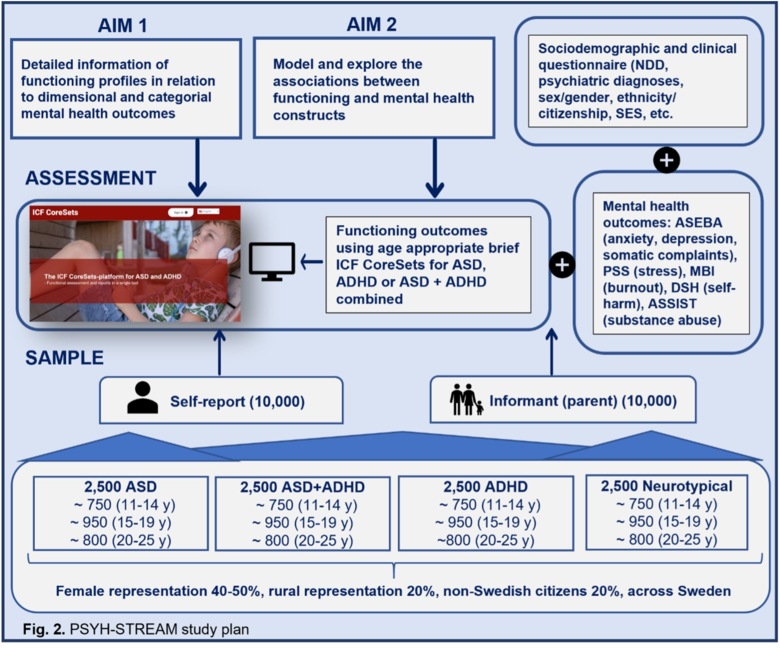ICF Core Sets for ADHD and autism
This research project has operationalized the International Classification of Functioning, Disability and Health (ICF) Core Sets for ADHD and autism into a user-friendly internet platform. This user-friendly internet platform will facilitate and standardize the assessment of individual functioning in individuals with ADHD and autism.
Standardized assessment based on the ICF Core Sets will provide a foundation for guiding the development and implementation of care, support, and strengths-based approaches. This project will also explore the relationship between functioning, mental health, and quality of life in a large population study of individuals with and without autism and ADHD.

Assessing function
Functioning is an individual’s ability to participate and engage in everyday life and meet society’s demands and expectations – it is about what a person can do within the context of their environment. Functioning is important to consider when seeking to understand the health and quality of life of individuals with autism and ADHD. Rather than focusing solely on diagnosis and symptoms, functioning provides a holistic perspective of an individual and their real-life abilities and challenges.
The National Board of Health and Welfare recommends the use of the ICF when working with function in all areas of life, from school to elderly care. The ICF was developed by the World Health Organization (WHO) and is based on a biopsychosocial model. A bio-psycho-social model acknowledges that an individual’s functioning or disability is not solely determined by their individual characteristics but also their environment, which can act to facilitate or hinder performance.
The ICF consists of almost 1,700 functional descriptions in the following areas:
- Body Functions - physiological and psychological functions (for example attention)
- Body Structures - anatomical parts of the body such as organs, limbs and their components (for example the brain)
- Activity - a person's performance of a task or action (for example reading, writing)
- Participation - a person's involvement in a life situation (for example going to school)
- Environmental Factors— the environment the person lives and works in, both physically, socially and attitudinally (for example accessibility and quality of health care)
- Personal Factors— other characteristics that can affect function, such as gender, age and lifestyle.
Clinically useful short versions of the ICF
The ICF is a comprehensive system, which makes it complex to use in clinical practice. Therefore, short versions of the ICF have been developed for specific diagnostic groups, so-called ICF Core Sets. These are developed according to a comprehensive scientifically structured procedure developed by WHO and the ICF Research Branch. KIND has developed ICF Core Sets for ADHD and autism. These ICF Core Sets contain only the most important and relevant functional descriptions for these diagnoses.
Current research with ICF Core Sets
A four-year international project led by KIND is currently being undertaken in collaboration with other researchers, interest organizations, clinical centers, and authorities. In this project, the ICF Core Sets for ADHD and autism have been operationalized into a user-friendly internet platform that will be used to gather large amounts of information on functioning, quality of life, and mental health in people with ADHD and autism, as well as neurotypical people. This information will help us to gain new knowledge about:
- how individual strengths and challenges are related to mental health
- how social participation affects mental health
- the links between environmental facilitators and barriers and mental health
In this research project, we will collect a large amount of information on mental health (anxiety, depression, nonsuicidal self-injury, somatic complaints, substance use, stress, and burnout) and functioning (strengths and challenges, participation, and hindering and facilitating factors in the environment) among people with and without autism or ADHD. The aim is to include 10,000 children, young people, and adults with and without autism or ADHD, as well as assessments from their relatives. Structural equation modeling and other statistical methods will be used to analyze the data.
Similar projects with KIND's Core Sets and platform are carried out in parallel and in collaboration with research colleagues in Great Britain and Germany.

The project is carried out with the support of Folksam, FORTE Stiftelsen Clas Groschinskys Minnesfond, Stiftelsen Promobilia, Stiftelsen Sunnerdahls Handikappfond and Trygg-Hansa and in collaboration with other researchers, Riksförbundet Attention, Organiserade Autister and Autism Stockholm.
